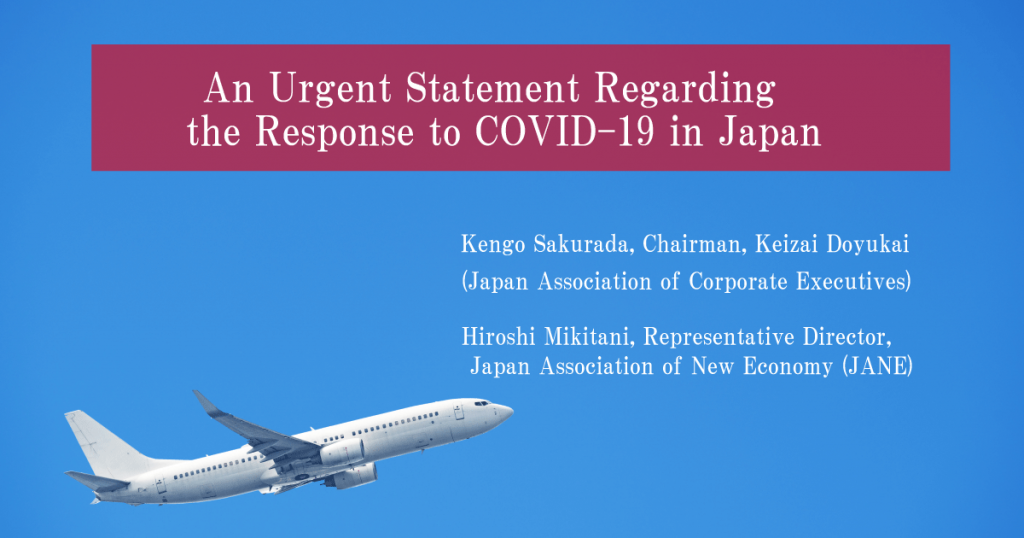- HOME
- Proposals/News
- Representative Director
- An Urgent Statement Regarding the Response to COVID-19 in Japan
An Urgent Statement Regarding the Response to COVID-19 in Japan

January 27, 2022
Kengo Sakurada, Chairman, Keizai Doyukai (Japan Association of Corporate Executives)
Hiroshi Mikitani, Representative Director, Japan Association of New Economy (JANE)
- Basic stance on response to COVID-19
(1) Based on the premise that we will continue to coexist with COVID-19 over the next several years, we must make a concentrated effort in the near term to implement necessary measures.(2) At the same time as taking necessary measures, the Japanese government must take a clear position not to restrict usual economic and social activities and entry of people across international borders.
(3) It is important that the government demonstrate an approach of “appropriate fear” (*1) in its policy decisions. Experts should gather and provide cutting-edge knowledge and evidence to support the government’s policymaking decisions and external communications. The government should continuously disseminate the latest findings and data as they become available.
(4)In response to changing circumstances, the government should review its measures with agility and flexibility, in order to continue to pursue optimal solutions. At the same time, the Prime Minister and the responsible ministers should explain to the public the aim of its policies and the reasons for the changes in an easy-to-understand manner.
- Specific measures
(1) Promotion of third dose vaccinations
The government must:
① Promote vaccination (including mix-and-match vaccination) as soon as possible so that vaccinations are widely available to the public, identify issues related to ensuring vaccination delivery systems, and implement countermeasures as quickly as possible.② Maximizing the use of the ability of the private sector to implement workplace vaccinations and incentives for vaccinations. Business organizations, companies, and other entities should leverage experience with workplace vaccinations to make active contributions.
③ Promptly implement mass vaccination at schools, from the elementary level to the university level. In this implementation, careful consideration should be given to personal and family circumstances. In particular, priority should be given to children and students at high risk of developing serious symptoms, such as those with underlying medical conditions.
(2) Strengthen countermeasures by focusing on key points
① Seriously ill patients and people at high risk of complications should in general receive early detection and immediate treatment. Mildly symptomatic patients and asymptomatic individuals should in general recover at home so as to reduce the burden on public health centers and medical services.② Review the classification of COVID-19 under the Infectious Diseases Control Law at the appropriate time. (From Category II to Category V.)
③ Expansion and enhancement of PCR tests and antigen tests.
・Expand the availability of tests beyond being limited to public health centers and medical services, increase the production and procurement of approved test kits, and lift the ban on online sales to individuals.
・Announce a clear government policy stating that individuals who test positive using voluntary tests will be treated at home if they are asymptomatic.④ Promote the general use of oral antiviral medicine.
(3) Take a clear stance on transitioning to a new normal
① Use of vaccines and testing packages.
・Restrictions such as pre-emergency measures should be reviewed flexibly in response to changes in the number of cases of COVID-19 and be lifted ahead of schedule if possible.
・Vaccines and test packages should continue to be actively used with operational adjustments made in alignment with scientific evidence, e.g. characteristics specific to the Omicron variant (*2)② Resume entry of people across international borders.
・Resume permissions for new entry into Japan for international talent, especially students from overseas, as soon as possible (*3) . The same regulations and rules for entering Japan should be applied as those that are applied to Japanese returnees.
・ International travelers who have received vaccines which are approved by the Japanese government should be subject to the same standards as those vaccinated in Japan with regard to self-quarantining and other measures. The period of time should be shortened or eliminated according to the domestic situation in Japan.③ Necessary support for the private sector
・Facilitate debt reduction for businesses with excess debt. (Establish legislation that enables debt restructuring by majority vote of creditors for companies eligible for loans sought in relation to complications arising as a result of COVID-19).
・Create an environment that encourages companies to adapt to life with COVID-19 and a “New Normal.” (Tax credits, tax exemptions, etc.)(*1)Paraphrasing the physicist and essayist Terada Torahiko, who wrote (originally in Japanese), “To fear too little or too much is easy, but it seems rather difficult to fear it properly.”
(*2)Limited vaccine efficacy against the Omicron variant has been identified. It may be necessary to minimize contact between unvaccinated people and those who have been vaccinated but have not been tested.
(*3)The current restrictions on new entry into Japan has been described as extremely strict compared to the global standard. Due to these restrictions, overseas students may choose to study elsewhere or to study a different language, causing Japan to lose out on talented human resources, which could lead to incalculable loss in the long term.

